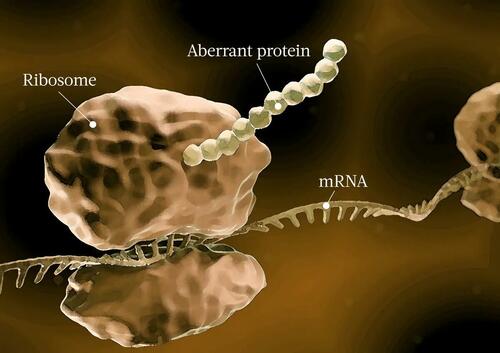
Authored by Marina Zhang via The Epoch Times (emphasis ours),
There may be around a 1 in 10 chance that Pfizer mRNA COVID-19 vaccines will not generate spike proteins but something else, a new Cambridge study finds, raising concerns about autoimmune response among experts.

The study authors found that 8 percent of the time, Pfizer mRNA COVID-19 vaccines are mistranslated, leading to the formation of unintended proteins.
“Our work presents both a concern and a solution for this new type of medicine,” said leading author Anne Willis in the study’s press release.
One can think of mRNA vaccines as a set of instructions used to make spike proteins. Once the vaccine enters the cell, ribosomes interpret the mRNA instructions to make proteins, like spike proteins.
If the instructions are misinterpreted, errors in the final protein may be produced. Some errors are minor, like misspelling one word in a text, while others are more detrimental.
This misinterpretation is called a frameshift, which occurs when one or two mRNA bases are skipped. Since mRNA bases are translated in sets of threes, skipping a base would affect all the sequences downstream, leading to new proteins being formed.

“Frameshifting results in the production multiple, unique and potentially aberrant proteins,” immunologist Jessica Rose wrote in her Substack article discussing the study.
While most naturally occurring mRNA contains uridine, the Pfizer mRNA vaccines use N1-methylpseudouridine. This makes the mRNA sequence hardier and less prone to breakdown by the immune system. Pfizer’s opting for less commonly occurring mRNA bases is also why some scientists call the mRNA vaccines modified RNA, or modRNA.
By implementing additional edits to the mRNA sequences, the authors were able to reduce further frameshifted proteins.
Although "there is no evidence: that the aberrant proteins generated by Pfizer vaccination are associated with adverse outcomes, for future use of mRNA technology, it is important that "mRNA sequence design is modified" to reduce these shifts, the authors concluded.
Among Tested Vaccines, Only Pfizer Has the Issue
Apart from frameshift errors, the N1-methylpseudouridine modification can also slow down and interrupt mRNA translation to protein, potentially leading to shorter-than-expected protein sequences.
"Under ideal circumstances, ribosomes translate the vaccine mRNA into the S [spike] protein ... If the cellular machine (ribosomes) 'detect' the difference [between normal uridine and N1-methylpseudouridine], it can result in stalling or mistranslation," Dr. Adonis Sfera, assistant clinical professor of medicine at Loma Linda University, wrote to The Epoch Times via email.
In the study, the researchers first inoculated mice with both Pfizer and AstraZeneca vaccines. They found that Pfizer vaccines were significantly more likely to produce frameshifted proteins.
Researchers then compared vaccine inoculations in humans, comparing 21 participants who took the Pfizer vaccine to 20 who took the AstraZeneca vaccine. None of the AstraZeneca vaccinees had an immune reaction to proteins made from mistakes in translation, but around one-third of the Pfizer vaccinees did.
Misdirected Immunity and Autoimmunity
The authors wrote that none of the Pfizer vaccinees developed adverse effects, but they were concerned about immunological consequences.
“Mis-directed immunity has huge potential to be harmful,” immunologist Dr. James Thaventhiran, one of the study’s lead authors, said in the press release. “Off-target immune responses should always be avoided.”
The authors did not further define misdirected immunity, though it generally describes a reaction where the body’s immune system targets the wrong thing.
In this case, it can mean that rather than training the body to fight spike protein, it is trained to fight unnaturally occurring proteins instead, as highlighted by Norwegian nutritional biologist Marit Kolby in her post on X.
Additionally, some health experts are concerned that these unique proteins may increase a person’s risk of developing autoimmune disorders.
Molecular biologist professor Vladimir Uversky, PhD, from the University of South Florida and physician Dr. Alberto Rubio-Casillas concluded that autoimmunity may occur if immune cells start attacking cells producing these aberrant proteins.
"A mistranslated protein can [also] resemble a human protein and trigger antibody formation," Dr. Sfera added.
Autoimmunity occurs when the immune system attacks self-tissues. It can occur for many years before symptoms manifest.
Study findings by immunologist Aristo Vojdani suggest that spike proteins have the potential to cause cross-reactions—meaning the body accidentally targets self-tissue in a fight against other pathogens—with over 20 different human tissues, as they share structural similarities with human proteins.
The production of these aberrant proteins and peptides may also increase a person’s risks of cancer, Mr. Uversky and Dr. Rubio-Casillas added in an email to The Epoch Times.
Melanoma cells have been shown to induce frameshifted proteins to escape immune detection.
“In our opinion, there is a possibility that during the translation of mRNA from COVID-19 vaccines, the aberrant proteins generated during frameshifting could activate survival mechanisms mimicking those developed by cancer cells to escape immune surveillance,” the two added.
Unknown Proteins in the Body
Researchers currently do not know the structure or sequence of the new proteins formed.
The authors identified in the study that one of the proteins detected was a chimeric protein—one formed by joining two or more genes that originally coded for separate proteins. The chimeric protein was structurally similar to human proteins, which might induce autoimmune responses.
“Of course, nobody knows for sure that the observations are linked to harms, but the fact they theoretically might be, and that regulators seem disinterested in investigating such a possibility, should be of huge concern to all,” Dr. Jonathan Engler, co-chair of the Health Advisory and Recovery Team (HART) told The Epoch Times. HART is a UK group of academic experts sharing concerns about COVID-19-related recommendations.
“It should be emphasized that the ... paper was submitted for publication nearly a year ago, and presumably, the work was carried out some months before then. Moreover, the investigators weren’t some third-rate-university, part-time academics,” he added.
Flawed Design
Dr. Engler said that the fact that the mRNA injections can be mistranslated is a design flaw. Other experts disagree.
"People are determined to make a mountain out of this molehill," Edward Nirenberg, a medical publisher, criticized the concerns in an X post about the study.
"Frameshifts are uncommon but naturally occurring events in, for example, viral infections ... These give rise to protein products that can also be targeted by the immune system.”
However, authors of the study have highlighted in the press release that the synthetic mRNA sequence used in the vaccine was “error-prone.”
Pfizer did not respond to requests for comment.
Authored by Marina Zhang via The Epoch Times (emphasis ours),
There may be around a 1 in 10 chance that Pfizer mRNA COVID-19 vaccines will not generate spike proteins but something else, a new Cambridge study finds, raising concerns about autoimmune response among experts.

The study authors found that 8 percent of the time, Pfizer mRNA COVID-19 vaccines are mistranslated, leading to the formation of unintended proteins.
“Our work presents both a concern and a solution for this new type of medicine,” said leading author Anne Willis in the study’s press release.
One can think of mRNA vaccines as a set of instructions used to make spike proteins. Once the vaccine enters the cell, ribosomes interpret the mRNA instructions to make proteins, like spike proteins.
If the instructions are misinterpreted, errors in the final protein may be produced. Some errors are minor, like misspelling one word in a text, while others are more detrimental.
This misinterpretation is called a frameshift, which occurs when one or two mRNA bases are skipped. Since mRNA bases are translated in sets of threes, skipping a base would affect all the sequences downstream, leading to new proteins being formed.

“Frameshifting results in the production multiple, unique and potentially aberrant proteins,” immunologist Jessica Rose wrote in her Substack article discussing the study.
While most naturally occurring mRNA contains uridine, the Pfizer mRNA vaccines use N1-methylpseudouridine. This makes the mRNA sequence hardier and less prone to breakdown by the immune system. Pfizer’s opting for less commonly occurring mRNA bases is also why some scientists call the mRNA vaccines modified RNA, or modRNA.
By implementing additional edits to the mRNA sequences, the authors were able to reduce further frameshifted proteins.
Although “there is no evidence: that the aberrant proteins generated by Pfizer vaccination are associated with adverse outcomes, for future use of mRNA technology, it is important that “mRNA sequence design is modified” to reduce these shifts, the authors concluded.
Among Tested Vaccines, Only Pfizer Has the Issue
Apart from frameshift errors, the N1-methylpseudouridine modification can also slow down and interrupt mRNA translation to protein, potentially leading to shorter-than-expected protein sequences.
“Under ideal circumstances, ribosomes translate the vaccine mRNA into the S [spike] protein … If the cellular machine (ribosomes) ‘detect’ the difference [between normal uridine and N1-methylpseudouridine], it can result in stalling or mistranslation,” Dr. Adonis Sfera, assistant clinical professor of medicine at Loma Linda University, wrote to The Epoch Times via email.
In the study, the researchers first inoculated mice with both Pfizer and AstraZeneca vaccines. They found that Pfizer vaccines were significantly more likely to produce frameshifted proteins.
Researchers then compared vaccine inoculations in humans, comparing 21 participants who took the Pfizer vaccine to 20 who took the AstraZeneca vaccine. None of the AstraZeneca vaccinees had an immune reaction to proteins made from mistakes in translation, but around one-third of the Pfizer vaccinees did.
Misdirected Immunity and Autoimmunity
The authors wrote that none of the Pfizer vaccinees developed adverse effects, but they were concerned about immunological consequences.
“Mis-directed immunity has huge potential to be harmful,” immunologist Dr. James Thaventhiran, one of the study’s lead authors, said in the press release. “Off-target immune responses should always be avoided.”
The authors did not further define misdirected immunity, though it generally describes a reaction where the body’s immune system targets the wrong thing.
In this case, it can mean that rather than training the body to fight spike protein, it is trained to fight unnaturally occurring proteins instead, as highlighted by Norwegian nutritional biologist Marit Kolby in her post on X.
Additionally, some health experts are concerned that these unique proteins may increase a person’s risk of developing autoimmune disorders.
Molecular biologist professor Vladimir Uversky, PhD, from the University of South Florida and physician Dr. Alberto Rubio-Casillas concluded that autoimmunity may occur if immune cells start attacking cells producing these aberrant proteins.
“A mistranslated protein can [also] resemble a human protein and trigger antibody formation,” Dr. Sfera added.
Autoimmunity occurs when the immune system attacks self-tissues. It can occur for many years before symptoms manifest.
Study findings by immunologist Aristo Vojdani suggest that spike proteins have the potential to cause cross-reactions—meaning the body accidentally targets self-tissue in a fight against other pathogens—with over 20 different human tissues, as they share structural similarities with human proteins.
The production of these aberrant proteins and peptides may also increase a person’s risks of cancer, Mr. Uversky and Dr. Rubio-Casillas added in an email to The Epoch Times.
Melanoma cells have been shown to induce frameshifted proteins to escape immune detection.
“In our opinion, there is a possibility that during the translation of mRNA from COVID-19 vaccines, the aberrant proteins generated during frameshifting could activate survival mechanisms mimicking those developed by cancer cells to escape immune surveillance,” the two added.
Unknown Proteins in the Body
Researchers currently do not know the structure or sequence of the new proteins formed.
The authors identified in the study that one of the proteins detected was a chimeric protein—one formed by joining two or more genes that originally coded for separate proteins. The chimeric protein was structurally similar to human proteins, which might induce autoimmune responses.
“Of course, nobody knows for sure that the observations are linked to harms, but the fact they theoretically might be, and that regulators seem disinterested in investigating such a possibility, should be of huge concern to all,” Dr. Jonathan Engler, co-chair of the Health Advisory and Recovery Team (HART) told The Epoch Times. HART is a UK group of academic experts sharing concerns about COVID-19-related recommendations.
“It should be emphasized that the … paper was submitted for publication nearly a year ago, and presumably, the work was carried out some months before then. Moreover, the investigators weren’t some third-rate-university, part-time academics,” he added.
Flawed Design
Dr. Engler said that the fact that the mRNA injections can be mistranslated is a design flaw. Other experts disagree.
“People are determined to make a mountain out of this molehill,” Edward Nirenberg, a medical publisher, criticized the concerns in an X post about the study.
“Frameshifts are uncommon but naturally occurring events in, for example, viral infections … These give rise to protein products that can also be targeted by the immune system.”
However, authors of the study have highlighted in the press release that the synthetic mRNA sequence used in the vaccine was “error-prone.”
Pfizer did not respond to requests for comment.
Loading…





